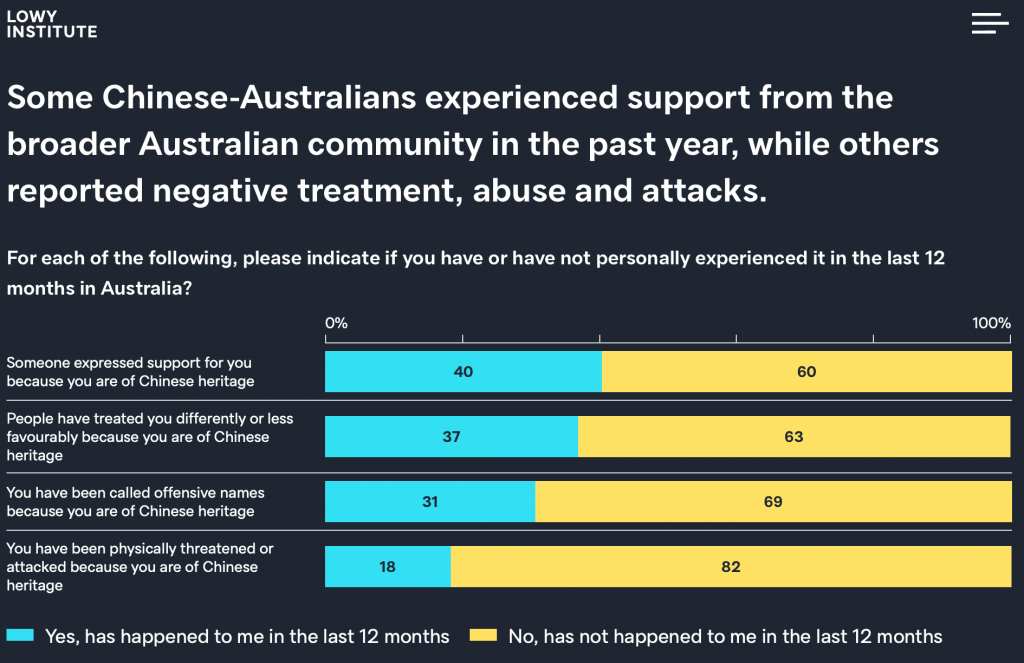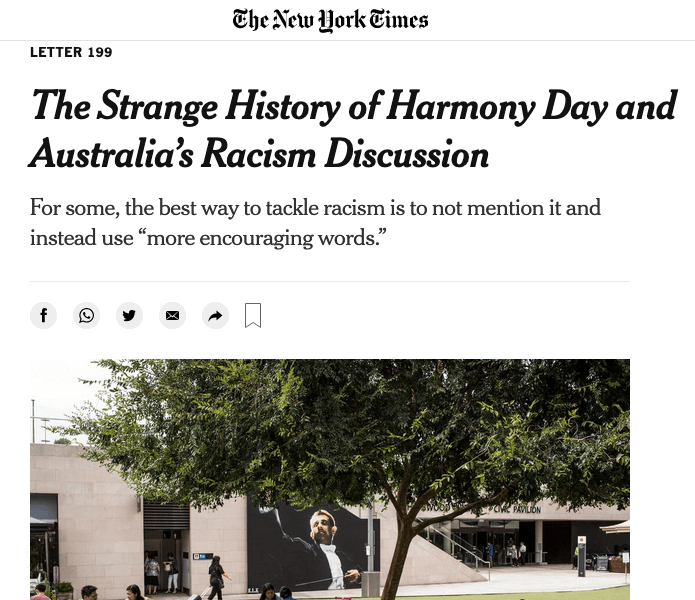Australia is experiencing alarming rates of racism and prejudice, most particularly against our Asian-Australian communities. We know this courtesy of a number of surveys including the Lowy Institute, Scanlon Foundation and a rise in incidents reported to the Australian Human Rights Commission, leading Race Discrimination Commissioner, Chin Tan to this week call for a new National anti-racism framework

Late last year, the Inner West Multicultural Network, having seen firsthand the divisive effects of COVID-19 reporting on Asian-Australians in particular as well as other minority groups, wanted to promote action at grass roots, community level. I strongly endorsed the need and joined to help drive the movement in all 547 Local Government Authorities (LGA’s) nationwide
It started with the Inner West Council, then Waverley, Ryde and City of Sydney, whose members likewise experienced racial vilification during COVID-19 and understood the urgent need for localised action
The NSW Legislative Council unanimously passed the resolution to join #RacismNotWelcome and many Councils around the country are preparing to do likewise. Interest has exploded including from Indigenous leaders, multicultural organisations and a cross section of civil society in a timely movement for a safe and inclusive society
The real purpose behind #RacismNotWelcome, as I saw it, is to normalise conversations about a subject that remains taboo, open space for people to talk about lived experience and confront the issue where it is most hidden, in local communities
Today, on the International Day for the Elimination of Racial Discrimination or the ‘End Racism Day’, instituted by the United Nations to commemorate the shooting in 1960 of 69 South Africans protesting apartheid, and in a week where hate crimes against Asian-Americans are on the rise, the message is that harmony and inclusion, diversity and cohesion are not enough
To be truly harmonious, we must confront racism to create safe communities for those Australians for whom the world is not safe. There can be no harmony where prejudice exists
Speaking only of ‘getting along together’ renders the evil of racism invisible and its victims powerless
Just this past week, we saw the first Council to vote against the #RacismNotWelcome movement to install street signs, empower affected voices and publicly acknowledge the problem. Cumberland City Council
The Notice of Motion was moved by Councillor Kun Huang, who was viciously racially abused in correspondence mirrored by that recently received by other non-anglo Councillors in NSW. The issue could not have been more immediate, proximal and real for any Council in the nation
The attack on Councillor Kun and other community leaders elsewhere is an attempt to erect barriers to public life for non-Anglo Australians and diminish access and agency in a democratic, multicultural society. We all have a responsibility to protect those most vulnerable, one that weighs most heavily on community leaders
Cumberland City is also one of Australia’s most diverse LGA’s with a high Chinese-Australian and Muslim-Australian population but the Council was split and the Mayor voted against with the casting vote. This decision is the perfect example why #RacismNotWelcome is so critical to create safer local communities where people’s voices are heard and respected
Racism is a non-partisan, social ill for which all Councillors and Members of Parliament should rise above party lines and act in the interests of all community members and it’s very troubling that a Council with one of our highest Asian-Australian populations, and its own experience of vicious racial vilification against Councillor Huang, failed to act. Local multicultural communities, who are driving the grass roots movement, want to know why
The reasons given during the Council meeting, though, are both very common, and disturbing
The first is to contend that acknowledging racism is itself harmful
As though it’s best to avoid naming an illness and to pretend it doesn’t exist. Not only does this fail the victims, but can serve to maintain, even enable the space where perpetrators operate. This refusal to strongly condemn and act against localised racism has serious consequences and every community leader should be acutely aware of their responsibilities right now
Wishful thinking will not help Kun or other Australians attacked in this way. Only naming it, outing it and confronting it will
Secondly, that the word ‘racism’ is somehow negative as mentioned in this New York Times article

In attacking the sources of racism, we are telling our fellow Australians, including our First Nations that we hear them, we care, we wish for a safe society for everyone and that we are together
For the rising percentage of Australians experiencing racial vilification, and in the context of ASIO’s increased vigilance of right wing hate groups, or ideologically motivated violent extremism as it’s now identified, constituting up to 40% of the organisation’s monitoring resources and on the increase, justifications don’t cut it. They need a public, coordinated, localised commitment and response, to be safe
Part of the immense social value of #RacismNotWelcome is that it exposes these conversations, fractures in understanding and empty arguments that have been hidden for too long and that can directly contribute to harm
Normalising the issue, and challenging community leaders to act are valuable and necessary steps to create space for marginalised communities to be heard, and feel a genuine sense of belonging
#RacismNotWelcome is an opportunity for every LGA to stand together for a safe and genuinely inclusive Australia. The campaign allows us all to clearly see where, and most importantly why, resistance to change exists and persists.
And that, in itself, is reason enough for the campaign
More information about #RacismNotWelcome including the street sign design and Notice of Motion for Councils can be found here